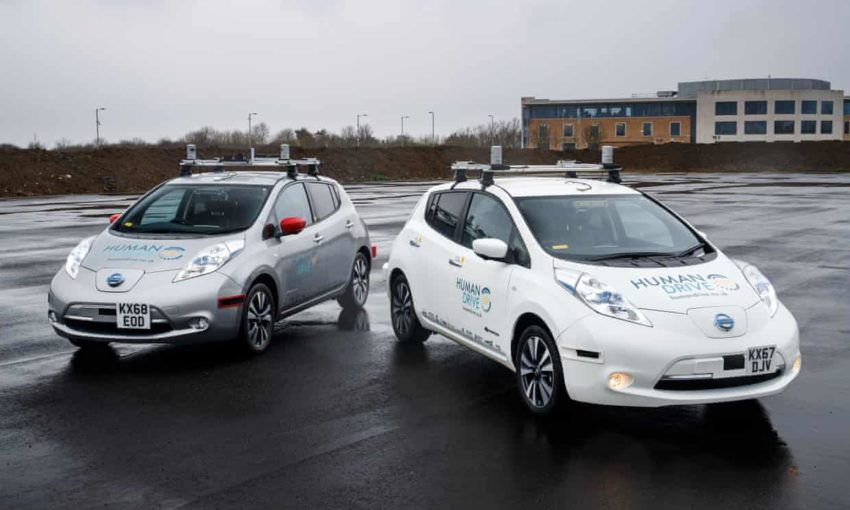Nissan Leaf breaks UK record for longest self-driving car journey
A self-navigating car has successfully driven itself for 230 miles, the longest and most complex journey undertaken so far on UK roads by an autonomous vehicle.
The Nissan Leaf, fitted with GPS, radar, Lidar laser measurement technology and cameras, travelled from Nissan’s technical centre in Cranfield, Bedfordshire, to the carmaker’s manufacturing plant in Sunderland, where the model is made.
Nissan says vehicle’s advanced positioning technology allows it to assess its surroundings and make decisions about how to navigate roads and obstacles.
During the journey, named the GrandDrive, the car travelled on a range of roads alongside traffic, from country lanes to the M1 motorway. The autonomous technology activated along the route whenever the vehicle needed to stop, start or change lanes.
The £13.5m HumanDrive project is jointly funded by the British government and an industry consortium of nine partners including Nissan and Hitachi. Its goal is to develop an autonomous vehicle control system that resembles a natural, human driving style. The vehicles have also been driven on test tracks as part of the project.
Bob Bateman, the project manager for Nissan’s Europe technical centre, said: “The HumanDrive project allowed us to develop an autonomous vehicle that can tackle challenges encountered on UK roads that are unique to this part of the world, such as complex roundabouts and high-speed country lanes with no road markings, white lines or kerbs.”
Two engineers remained in the car throughout the journey, which achieved its target of 99% self-navigation. Human drivers briefly took over the controls when the car pulled in at four service stations en route for checks and charging.
The Nissan Leaf used in the project is not the only self-driving car being tested on the streets of Britain. Ford Mondeos fitted with autonomous technology from the UK tech firm Oxbotica travelled on public roads around the former Olympic Park in Stratford, east London, in October 2019, during trials for a separate partially government-funded project in a complex urban environment. In addition, Oxbotica hopes to begin the first passenger trials of its autonomous ride-sharing taxi service with the cab firm Addison Lee in London in June.
The British car industry has promoted the economic opportunities of developing self-driving cars. The Society of Motor Manufacturers and Traders said in a 2019 report that the industry could produce a £62bn economic boost by 2030, and believes Britain has significant advantages over other countries in pushing autonomous vehicles.
Driverless car trials around the world have not been without controversy and concerns for the safety of other road users. Uber, which has been testing its self-driving cars in numerous US states, temporarily paused the trials in March 2018 after a vehicle in autonomous mode killed a woman in the street in Arizona, in what appeared to be the first reported fatal crash involved a self-driving vehicle and a pedestrian in the country.






